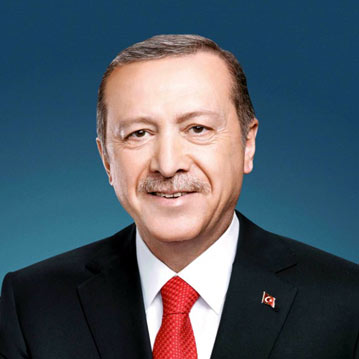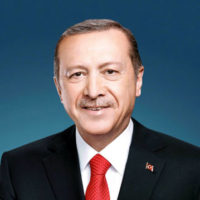



Educated in an Imam Hatip school, Erdoğan was a semi-professional footballer playing for Kasımpaşa Spor Kulübü and was involved in Islamist political movements as a student before being elected as the Mayor of İstanbul from the Islamist Welfare Party in 1994. He was banned form office and sentenced to 10 months in prison for religious intolerance in 1998 and later abandoned openly Islamist politics, establishing the moderate conservative AKP in 2001. Winning just short of a two-thirds parliamentary majority in the 2002 general election, the party’s co-founder Abdullah Gül became Prime Minister until his government annulled Erdoğan’s ban from political office. Erdoğan subsequently became Prime Minister in March 2003 after winning a seat in a by-election held in Siirt.
As part of his ‘2023 vision’ for the centenary of the establishment of the Turkish Republic, Erdoğan’s government oversaw accession negotiations for Turkey’s membership of the European Union, an economic recovery following a financial crash in 2001, two successful constitutional referendums in 2007 and 2010, a Solution process with Kurdish militants, an allegedly Neo-Ottoman foreign policy and investments in infrastructure that included new roads, airports and a high-speed train network. With the help of Fethullah Gülen’s Cemaat Movement, Erdoğan was able to curb the political power of the military through the controversial Sledgehammer and Ergenekon court cases. Child poverty rose to 63.5% while Turkey suffered the highest number or workers’ deaths in Europe, with 301 miners being killed in a mine disaster in Soma.
Nationwide anti-government protests broke out in 2013 against the growing authoritarianism of Erdoğan’s government, with an internationally criticised crackdown on protestors by police and AKP youth members that led to 22 deaths resulting in Gülen withdrawing support from the AKP and EU ascension talks stalling. A US$100 billion government corruption scandal in 2013 led to the arrests of Erdoğan’s close allies, with Erdoğan himself incriminated after a recording was released on social media. Blaming the scandal on a coup attempt by a parallel structure formed of Gülen’s supporters in high judicial offices, Erdoğan implemented large-scale reforms to the police and judicial systems that were criticised for placing the judiciary’s independence in doubt. Erdoğan’s government has since come under fire for a crackdown on press and social media, electoral fraud, demeaning the Constitution and alleged human rights violations, having blocked access to Twitter, Facebook and YouTube on numerous occasions. He has come under fire for illegally constructing Ak Saray, the world’s largest palace on Atatürk Forest Farm and Zoo for his own use as President and has advocated an executive presidency system of government that would boost his powers. In 2015, amid consistent allegations that he maintained financial links with Islamic State of Iraq and the Levant militants, revelations that the state was supplying arms to militant groups in Syria in the 2014 National Intelligence Organisation lorry scandal led to accusations of high treason. Opposition journalists and politicians have thus branded him a dictator.
Source: https://en.wikipedia.org/wiki/Recep_Tayyip_Erdo%C4%9Fan
Sayin Abdullah Gül, GCB, Ph.D (born October 29, 1950) is the 11th President of the Republic of Turkey, serving in that office since 28 August 2007. He previously served for five months as Prime Minister (2002-2003), and as Foreign Minister from 2003 to 2007.
Prime Minister Recep Tayyip Erdogan’s selection of Gül as a presidential candidate drew strong and highly vocal opposition from ardent supporters of secularism in Turkey. In May 2007, Gül’s first bid for presidency was blocked by the Constitutional Court, in a climate of secularist concern regarding views Gül had expressed during his Welfare Party years, and the fact that his wife, Hayrünnisa Gül, wears a headscarf, seen by some as a symbol of political Islam. However, following the parliamentary elections in July the same year, which were won by the AKP with 46.6% of the popular vote, he was eventually elected President on August 28, 2007 and was sworn in the same day, becoming the first former-Islamist President in the modern history of Turkey, which has been described as a “new era in Turkish politics”. In September 2008 he became the first Turkish leader to visit neighbouring Armenia, sparking a major debate in Turkey.
Ahmet Necdet Sezer, Former President of Turkey
Ahmet Necdet Sezer was born on 13 September 1941 in Afyon. He graduated from Afyon High School in 1958.
He graduated from the Ankara University Faculty of Law in 1962 and began his career as a judge in Ankara. Following his military service at the Military Academy, he served first as a judge in Dicle and Yerköy, and later as a supervisory judge in the High Court of Appeals in Ankara. In 1978 he received LL.M. in civil law in Ankara University Faculty of Law.
On 7 March 1983, he was elected as a member to the High Court of Appeals. As he was a member in the Second Chamber of Law, Sezer was recommended to the president by the plenary assembly of the High Court of Appeals among the three candidates for appointment as member of the Constitutional Court. On 27 September 1988, he was appointed by the president as member of the Constitutional Court. On 6 January 1998, he was elected chief justice of the Constitutional Court.
Ahmet Necdet Sezer was elected as the tenth president by the Turkish Grand National Assembly on 5 May 2000 and assumed his duties on 16 May 2000.
President Sezer married Semra in 1964 and has three children.
Rishi Sunak, Prime Minister of the United Kingdom (since Oct 25, 2022) Rishi Sunak (born…
Giorgia Meloni, Prime Minister of Italy (since Oct 22, 2022) Giorgia Meloni (born 15 January…
Mahamat Déby, President of Chad (since Oct 10, 2022) Mahamat Idriss Déby Itno (born 1…
João Lourenço, President of Angola (sworn in on Sept 26, 2017) Sworn in for his…
William Ruto, President of Kenya (elected on Aug 9, 2022 with 50.5% of the vote)…
Gustavo Petro, President of Colombia (since Aug 7, 2022) Gustavo Francisco Petro Urrego ODB ODSC…
This website uses cookies.
View Comments
Dear Prime Minister Erdogan:
This is my third contact to you regarding Workplace Bullying. It occurred to me that my request might be unclear. Therefore, I have written a sample letter to show you what I had in mind. Feel free to use this letter, on your letterhead, or change as you find necessary.
The letter could be from someone else in your office also.
Thank you for your help. I know first hand how Workplace Bullying can harm your health. Eight years of bullying caused me to have heart disease and a stroke.
Sincerely,
Lana Cooke
West Virginia Healthy Workplace Bill State Coordinator
304 692-7579 thehealthyworkplace bill.org (then go to West Virginia's page to see me.
The sample letter is typed below:
**********
Date November 8, 2014
The Honorable West Virginia House of Delegate and Senate members:
1900 Kanawha Boulevard East
Charleston, West Virginia 25305
Dear Honorable Senators and Delegates:
Turkey’s Law regarding Workplace Bullying is noted below: It is my understanding that opponents are fearful that such a law would be bad for businesses.
Turkey’s Law regarding Workplace Bullying is noted below:
An employer must protect all employees from psychological abuse in the workplace pursuant to an amendment to Article 417 of the Debts law passed by the Turkish parliament in January 2011. The law makes it an offenSe to commit certain acts or fail to take action to prevent the commitment of acts such as verbal insults, belittling, and intentional isolation.
I am writing in regard to the United States Grassroots effort to pass a law in all 50 states, in particular, West Virginia, making Workplace Bullying illegal, as it is in Turkey.
I want to assure you that we have found the law to actually be very good for businesses.
Bullying is already costly and eroding productivity through turnover and absenteeism. Most laws contain generous affirmative defenses for employers. Compliance is
simple. Create an explicit law prohibiting an abusive work environment, faithfully enforce it, then only the abusive individual will be accountable.
Bullying slowly erodes good businesses until they have to go out of business.
On behalf of the good workers in West Virginia, your sister-country of Turkey, asks that you support this Healthy and Safe Workplace Act Law.
Prime Minister Erdogan